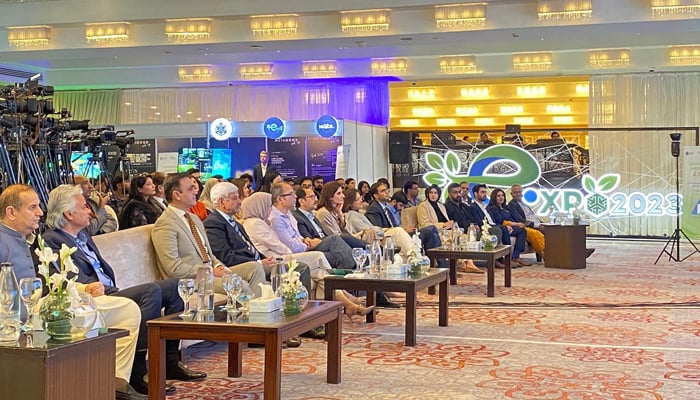Climate diplomacy — a new form to protect national security interests
Islamabad: Shafqat Kakakhel, Chairperson, Board of Governors, SDPI, has said the climate diplomacy emerged as a new form of diplomacy where it was not only to safeguard national security interests of the country but also ensure the commercial and economic cooperation with the international community.
Mr Kakakhel was addressing a plenary session of 3-day 26th Sustainable Development Conference being organised here by Sustainable Development Policy Institute. The overarching theme of this year is “Light at the end of the tunnel: hope in times of despair.” Mian Iftikhar Hussain, Secretary-General, Awami National Party (ANP), speaking on the occasion said that fear and security were the main issues of the Khyber Pakhtunkhwa province with poor water governance further aggravating the crisis as almost 80 per cent of the freshwater is wasted due to poor storage capacity.
Senator Taj Haider, the central leader of Pakistan People’s Party (PPP), said the economic build up should be the priority to be addressed on war footings as it is an existential threat if left unattended. Saleem Mandviwalla, former State Minister for Finance, said governance was the core issue of the country and the past 16 months were crucial to save the country from default. However, he said, lack of governance, political instability and bureaucratic hiccups needed to be addressed for a better economic system and betterment of the country.
Former National Security Adviser Dr Moeed Yusuf said no relevant experts are deployed to the fields at Pakistani missions abroad to promote economic diplomacy like IT or medical diplomacy.
Riaz Nazar Ali Chunara, Managing Director, National Institute of Baking and Finance (NIBAF), said the State Bank of Pakistan is diligently working toward digitalisation of economy and banking sector in the country.
Dr Wasim Iftikhar Janjua from SDPI said that tobacco industry is building a deceptive narrative about the use of tobacco products to enhance their sales by misleading the youth and general folk. Khurram Hashmi of Vital Strategies stressed the need for enhancing knowledge base including literature against tobacco usage in curriculum and engaging all stakeholders against illicit trade of tobacco.
Senator Dr Musadik Malik said that the country needs to focus more on its water productivity, agriculture yield and the rising young entrepreneurs and startups linked to small and medium enterprises (SMEs) to ensure its economic sustainability and revival.
Aisah Ghaus Pasha, former Minister of State for Finance and Revenue, said the country would have faced great inflation, unemployment and public unrest if the default had not been averted. She added that the IMF bailouts were needed to manage the fiscal issues of the country whereas it was necessary to implement quick and precise policy decisions.
Dr Tariq Mukhtar, Dean, University of Arid Agriculture, Rawalpindi, said from global perspective, an overall 3.1 billion population is unfortunately unable to afford healthy diets as per 2021 data. In addition, he said, the vulnerability of Pakistanis also increased in the aftermath of Russian-Ukraine war that led to sharp increase in the commodity prices world over. Dr Shaheen Ashraf Shah from World Food Programme said women farmers’ condition in Pakistan is very poor and there is urgent need for their financial inclusion and skill development. However, she said women have a very low number of employments within the country’s systems be it food systems or the transportation system. She said bringing more women in these institutions will be the first indicator for substantive change.
-
 Kate Hudson Explains Why Acting Isn't Discussed At Home
Kate Hudson Explains Why Acting Isn't Discussed At Home -
 Prince William, Kate Middleton Epstein Statement Was AI Generated, Says Expert
Prince William, Kate Middleton Epstein Statement Was AI Generated, Says Expert -
 Sarah Ferguson On Her Way To Hurt 'only Two People Who Care About Her'
Sarah Ferguson On Her Way To Hurt 'only Two People Who Care About Her' -
 World’s Top PC Maker Sounds Alarm Over Memory Chip Shortage
World’s Top PC Maker Sounds Alarm Over Memory Chip Shortage -
 King Charles Is ‘clearly Worried’ Andrew Has Tarnished Royal Image
King Charles Is ‘clearly Worried’ Andrew Has Tarnished Royal Image -
 Royal Family Loses 'loyal' Worker After King Charles Disliked His Work?
Royal Family Loses 'loyal' Worker After King Charles Disliked His Work? -
 James Van Der Beek's Quiet Sacrifice Before Death Comes To Light
James Van Der Beek's Quiet Sacrifice Before Death Comes To Light -
 Suspect Kills Six Across Florida Before Taking His Own Life
Suspect Kills Six Across Florida Before Taking His Own Life -
 AI Helps Researchers Identify 2,000-year-old Roman Board Game Stone
AI Helps Researchers Identify 2,000-year-old Roman Board Game Stone -
 Inside Kate Middleton, Prince William’s Nightmare Facing Andrew Mountbatten-Windsor
Inside Kate Middleton, Prince William’s Nightmare Facing Andrew Mountbatten-Windsor -
 Margaret Qualley Shares Heartfelt Confession About Husband Jack Antonoff: 'My Person'
Margaret Qualley Shares Heartfelt Confession About Husband Jack Antonoff: 'My Person' -
 Savannah Guthrie Shares Sweet Childhood Video With Missing Mom Nancy: Watch
Savannah Guthrie Shares Sweet Childhood Video With Missing Mom Nancy: Watch -
 Over $1.5 Million Raised To Support Van Der Beek's Family
Over $1.5 Million Raised To Support Van Der Beek's Family -
 Paul Anthony Kelly Opens Up On 'nervousness' Of Playing JFK Jr.
Paul Anthony Kelly Opens Up On 'nervousness' Of Playing JFK Jr. -
 Diana Once Used Salad Dressing As A Weapon Against Charles: Inside Their Fight From A Staffers Eyes
Diana Once Used Salad Dressing As A Weapon Against Charles: Inside Their Fight From A Staffers Eyes -
 Video Of Brad Pitt, Tom Cruise 'fighting' Over Epstein Shocks Hollywood Fans
Video Of Brad Pitt, Tom Cruise 'fighting' Over Epstein Shocks Hollywood Fans




